4 Cooperative Board Games for
4-year-olds
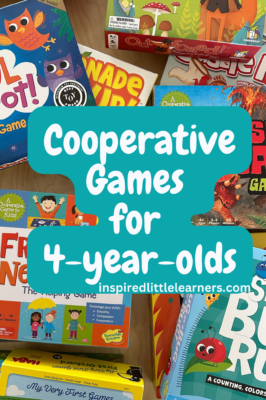
By age 4, you can start introducing board games with a little more complexity to their gameplay. Often these board games will use some strategy in the gameplay and cooperative games are no different! With cooperative games, all players are working together, which makes cooperative games a great choice when introducing board games that require strategic thinking. With cooperative games, players are naturally discussing possible move choices and their outcomes with one another. Cooperative games offer the opportunities for younger players to learn strategic gameplay skills from older players through communication and working together in the decision making process.
This article is my second in a series of articles focusing on cooperative games by age! Use these posts as a loose guideline- just because a board game shows up in a list for one age, doesn’t mean that it can’t be enjoyed by kids of other ages as well!! All of the games on this list are still enjoyed by my kids who are now 5 and 6-years-old!
This post may contain affiliate links. As an Amazon Associate and participant in other affiliate programs, I earn a small commission on qualifying purchases (at no additional cost to you). Thank you for your support! Read our disclosure policy here.
Friends & Neighbors: The Helping Game by Peaceable Kingdom
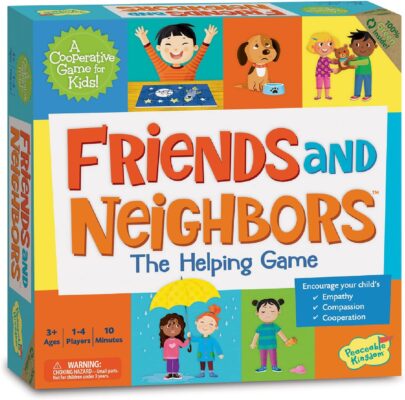
Friends and Neighbors: The Helping Game by Peaceable Kingdom is a unique game because it helps kids learn about empathy, kindness, and cooperation! Empathy and kindness are important topics to talk to your kids about starting at a young age, and I really love this game as a conversation starter for preschool-age kids.
During the game, players select a token from the “Helping Bag” and use it to help a neighbor that is on the game board. For example, you may select a token with a bandage, which you can use to help a neighbor that fell and cut their knee. As you play the game with your child, you can discuss what emotion the neighbor is expressing (sadness, anger, fear, frustration, etc). The characters can also be used as a conversation starter, by asking your child if they have ever felt that way and when. As the child selects a token from the “Helping Bag”, you can discuss how you can compassionately use that item to help a neighbor. The game also includes a small book that illustrates each resolution that is included in the game. The book illustrates how the neighbor feels after you act compassionately. For example, on one card a child feels frustrated that they are unable to reach a glass of juice. You provide them with a stool and they feel happy that they can now reach!
Friends and Neighbors: The Helping Game is a very simple and quick (less than 15 minutes) game to play, but the learning opportunities it provides are invaluable. This is a great cooperative game to play with 3- or 4-year-olds!
Hoot Owl Hoot! by Peaceable Kingdom
Hoot Owl Hoot! by Peaceable Kingdom is a favorite cooperative game in which players try to help the baby owls fly back to their nest before the sun comes up. You do this by playing a color card and moving an owl to that corresponding color on the game board. The basic game play makes it great for younger kids (my 3-year-old enjoys playing) and you can change the difficulty level of the game from Beginner Level to Challenge Level by playing with different number of owls. This game actually involves a lot of strategy in terms of which color card to play to get the owls to the nest quickly (and before the sun rises)! The strategic thinking involved in Hoot Owl Hoot! makes is a great game for gameschooling or to enjoy during family game night!
If you have a dinosaur-loving kid (like I do), Baby Dinosaur Rescue plays very similar to Hoot Owl Hoot!
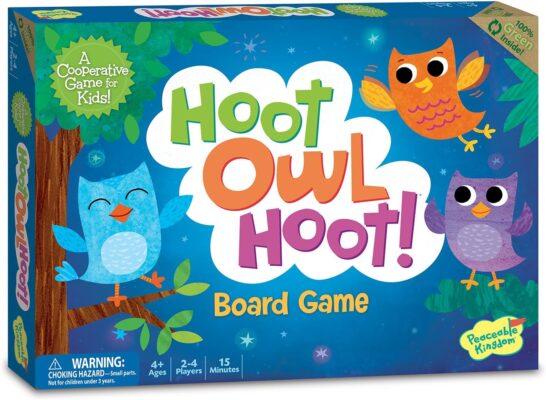
Dinosaur Escape by Peaceable Kingdom
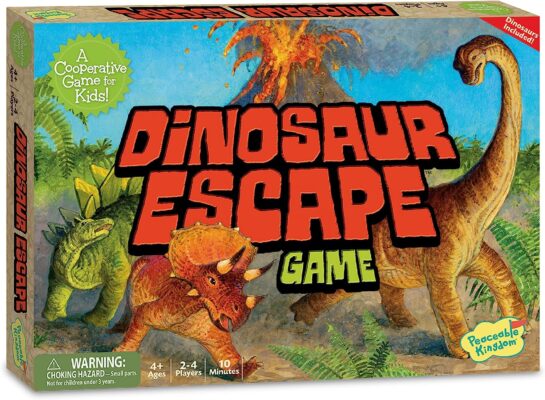
The next game on my list of recommendations is another cooperative game by Peaceable Kingdom: Dinosaur Escape. Dinosaur Escape involves memory, counting, strategy skills, and a bit of luck! Dinosaur Escape is a great introduction to strategic games because all players work together, so you can discuss what move should be made on each turn. During the game, players take turns rolling a die to move three dinosaur figurines around the board, turning over fern tokens as they move. If you reveal a dinosaur on a token and that figurine is in the same habitat as the token, you have helped the dinosaur move the dinosaur to Dinosaur Island! Fern tokens also contain other objects (rocks, bones, etc); after revealing an object on a fern token, you flip it back over before the next person’s turn, so players must remember which fern tokens have already been turned over as they search to reveal the dinosaurs. If a player rolls a volcano on the die, one piece is added to a cardboard volcano. The object of the game is to work together to help all three dinosaurs escape to dinosaur island before the volcano has been built!
My First Castle Panic by Fireside Games
My First Castle Panic by Fireside Games is the “junior” version of the game Castle Panic. In this game, players work together to catch monsters before they reach the castle. My First Castle Panic uses strategic thinking and planning ahead as you decide what card to play on each turn and it is a great introduction to strategy games for younger kids. Since it is a cooperative game, players can make the decision together and discuss the possible outcomes of playing different cards. During the game, players use color and shape matching skills, both of which are great to practice with your preschooler! The game also doesn’t take very long to play (15-20 minutes), which is perfect for younger kids.
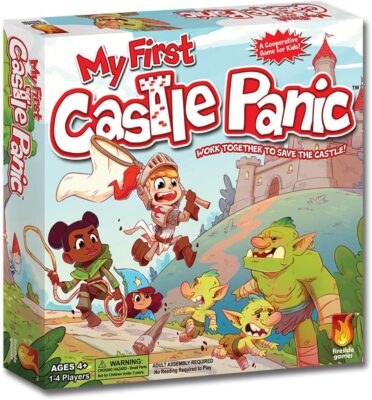
Honorable Mention
The following are currently hard to track down or may be out of print. Keep your eye out for these in game stores or second hand shops!
Lemonade Shake Up! by Peaceable Kingdom
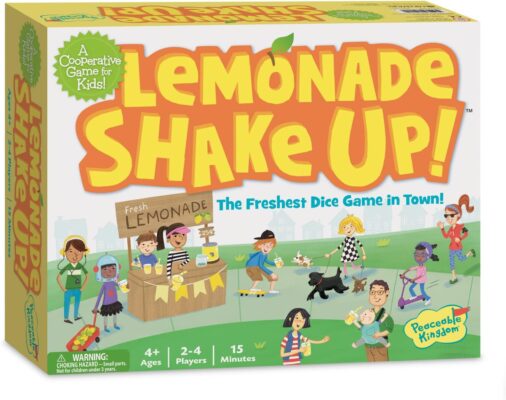
In Lemonade Shake Up! by Peaceable Kingdom, players take turns rolling 5 dice trying to get the ingredients to complete one of the recipe cards. A player can roll a total of 3 times during a turn to try to complete a recipe (you can keep some dice to the side and reroll the rest of the dice). Once you complete a recipe, you earn quarters. During this game, all players work together as a team trying to earn 12 quarters. If you can’t complete a recipe, you must collect a sour lemon token. If you get 4 sour lemon tokens before the money jar is full, you lose and must try again. While most cooperative games are fairly easy to win, this game requires some luck to win (you may not be able to complete all of the recipes before getting 4 sour lemon tokens). I think “losing” a cooperative game is a great learning opportunity, especially for younger players. Older players can model how to lose gracefully, and because all players lose together, there aren’t the hard feelings that can sometimes be associated with losing a competitive board game.
If you are interested in more cooperative games, be sure to check out these posts:
3 Cooperative Board Games for 3-year-olds
5 Cooperative Board Games for 5-year-olds
Why Play Cooperative Board Games with Kids?
If you are interested in more favorite games by age group, be sure to check out these posts:
Favorite Games for 2-year-olds
Favorite Games for 3-year-olds
Favorite Games for 4-year-olds
If you are looking for more game recommendations for preschool-age kids, be sure to check out these posts:
Five Preschool Games for Learning Colors
Seven Great Games for Preschoolers
